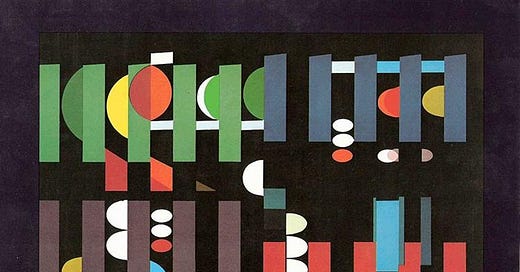The first time I tried reading John Cowper Powys was during the summer of 2019. I had just moved from one apartment to another (right across the stone courtyard of the complex) and everything smelled of dust; nothing, not the coffee maker nor my books nor my furniture, had found its right place, all was in a state of flux, and yet things were preternaturally pleasant: it was an easy move that took a single day of walking over armfuls of belongings, and the weather was perfect, rainy, warm, sunny and cool by turns. That next day after the move, in my new high-ceilinged apartment that was almost more like its own little house, connected to and connecting the other apartments in the (very old) complex like a presiding centerpiece, I sat down in a creaking rocking chair by my new front door, morning sunlight illuminating the layer of dust on the wood floor below the brittle glass panes, poured myself a cup of coffee, and opened my copy of Maiden Castle, the fourth and last of Powys’ Wessex novels, and, I had read at the time, his least liked book. Because of this, I was, of course, determined to like it. And for about 180 pages, I liked it very much (starting a new book in a new place and the resultant impression of novelty is enough to greatly propel my interest – but this overwhelming, if simple, joy I take in compounded novelty surely also warps and obscures my perspective of things). Every morning for almost a week, I would make my coffee, pull the rocking chair over to the same spot by the front door, and read Powys, riveted by the carnivalesque, prose-poetic absurdities of his characters. I enjoyed the tightly packed printed pages of my Overlook Press edition and the stained-glass cover art. And then, for whatever reason, I stumbled upon a line of dialogue or a description of a character (either Dud [!] or Wizzie [!!], I cannot remember), something probably insignificant, that struck me as so unbelievably ridiculous and laughable to the point of no-laughter that I put the book down and, shaking my head as if annoyed with myself, decided to give up altogether and read something else – anything else. It was like I had woken up from a dream: what had so engrossed me at every step (for a whole week) became, in a flash, flailing, discontinuous, and impossible to understand or sympathize with: in a word, stupid.
I quickly read Hunger by Hamsun and then picked up The Books in My Life by Henry Miller. As always with Miller, I was bamboozled for the few days it took me to fly through the book. I remember thinking that if I had copied out every line I wanted to, I would have ended up transcribing the whole thing (and I did write down a lot from it, my desk in its new place by a great, gigantic, north-facing window – any excuse I could use to sit there and mull things over, delaying the conclusion of the book toward which I was speeding). Few books have ever reassured me so strongly of the inexhaustibility of the creative drive that treats even the limiting reality of death as a mere horizon. I think of what Burton Pike says about Musil and his crazy endeavor, The Man Without Qualities: “Like Goethe, Musil had a strange sense of having infinite time stretching out before him in which to complete his task.”1
But I was stopped short by a section about John Cowper Powys. Henry Miller met him, he relates, in New York, outside of the Labor Temple, after hearing one of Powys’ lectures.2 This meeting did not seem to develop into any kind of relationship until years later when Miller finally wrote a letter to “Prester John,” as Powys names himself in his autobiography, Visions and Revisions.3 Miller’s “unholy veneration” for the writer seems to have turned their first meeting into a one-way-street of awe. “It took all the courage I then possessed to go up to him after the lecture and say a few words of appreciation, to shake his hand and then flee with tail between my legs.”4 Reading Powys’ biography as he is writing The Books in My Life, Miller says that Powys, like Céline, “can speak of himself in the most derogatory terms, call himself a fool, a clown, a weakling, a coward, a degenerate, even a ‘sub-human’ being, without in the least diminishing his stature,”5 so truthful and stimulating is his work. Could this actor-like, clownish prose have been what pushed me away from Maiden Castle? (Irony at the level of the narration is easy to mistake for a silliness in the creation of characters, as is apparent in Thomas Mann’s extremely ironic books.) Now, of course, having an “unholy veneration” for Miller myself, there occured a natural transference of appreciation to Powys, whom, let us not forget, I had recently read and discarded with as much initial vehemence as final abruptness. So, I started to wonder if maybe I had given up too easily, if maybe I should have closed my eyes and let the meaning of Maiden Castle explicate itself a little longer, like the sense of a dream that re-coalesces not long after you have once again closed your eyes after briefly waking very early in the morning.
Thanks for reading COM-POSIT! Subscribe to get the next part of “Reading and Not Reading” when it comes out
Burton Pike, The Man Without Qualities (Robert Musil). “From the Posthumous Papers,” Preface. Vintage International. xii.
Henry Miller, The Books in My Life. New Directions. 1969. 135
John Cowper Powys. G. Arnold Shaw. New York. 1915.
Henry Miller, The Books in My Life. New Directions. 1969. 135.
Ibid. 135–136.




